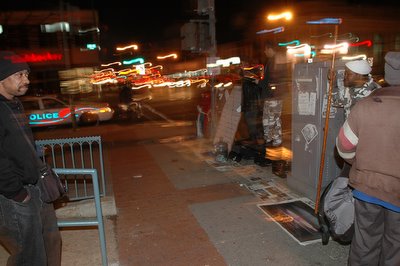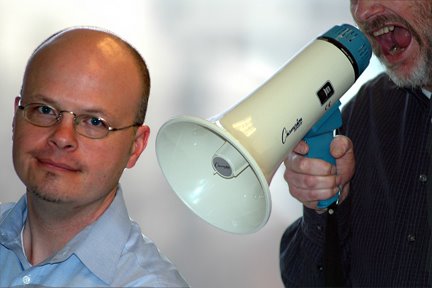Noise Duration Just as Detrimental as Loudness
 (CLICK TO ENLARGE) The D.C. law renders police powerless to do anything about the blaring amplifier pointed at the houses. Traffic noise hums as amplified speech blares from the corner of H and 8th Streets NE on Jan. 28. (Copyright © 2006. David Klavitter)
(CLICK TO ENLARGE) The D.C. law renders police powerless to do anything about the blaring amplifier pointed at the houses. Traffic noise hums as amplified speech blares from the corner of H and 8th Streets NE on Jan. 28. (Copyright © 2006. David Klavitter)Many people, having read my “Quest for Quiet” blog, have taken a genuine interest in the noise issue at H and 8th Streets NE. For that, the residents in and around the 700 block of 8th Street are grateful. However, upon visiting the intersection and listening to the amplified speech for themselves, first-time visitors often conclude that the noise is not really “that loud.”
Loudness is only one factor. Duration of the noise also affects the neighborhood.
To understand what’s at issue for the neighborhood, try this: Take a steel pot and place it under your kitchen or bathroom sink. Turn the water on just enough so that a drop of water drips out every few seconds. Let this continue for four or more hours while you try to read, write, sleep or have a conversation. More than likely it will drive you bonkers.
One drop of water into a bucket may not be loud. But the continued dripping of water over an extended period of time can become annoying, distracting and aggravating—especially when one has no control over the sources of the noise. That’s what the neighborhood experiences each Saturday.
My example is supported by research from a publication from the U.S. Environmental Protection Agency (EPA). It’s titled, “Noise Effects Handbook: A Desk Reference to Health and Welfare Effects of Noise.” It was published by the EPA’s Office of the Scientific Assistant, Office of Noise Abatement and Control in October 1979 and revised July 1981. Here are a few key excerpts:
What physical qualities of noise affect a person's subjective response?
The physical attributes of noise that can affect an individual's subjective response include: apparent loudness or intensity, spectral shape, presence of discrete frequency components, abruptness or impulsiveness, intermittency, duration, and temporal variations.
Besides the physical attributes of the noise itself, what other aspects of the exposure situation affect the individual's response?
Among the factors that affect an individual's response to noise are contextual factors such as: the time of day, the activity interfered with, the ability to control the source, and the information content of the noise. Response may also be affected by personal factors such as previous experience with noise exposure or socio-economic and educational status.
To what degree does noise cause neighborhood dissatisfaction?
The HUD Annual Housing Survey (1975, 1976) indicates that noise is the most frequently cited undesirable neighborhood condition, surprisingly ranking higher than crime. Noise is often given as the reason for residents wanting to move from their neighborhoods.


1 Comments:
You make an excellent point. Aside from the sheer volume (both at the corner and into the neighborhood), the duration and ceaselessness must be mind-numbing for those within the extended earshot. Although I'm lucky enough to live over on Parker Street, far enough away that I don't hear the commotion, I completely simpathize with your cause--and certainly wouldn't want to have to listen to the ranting non-stop.
Post a Comment
<< Home